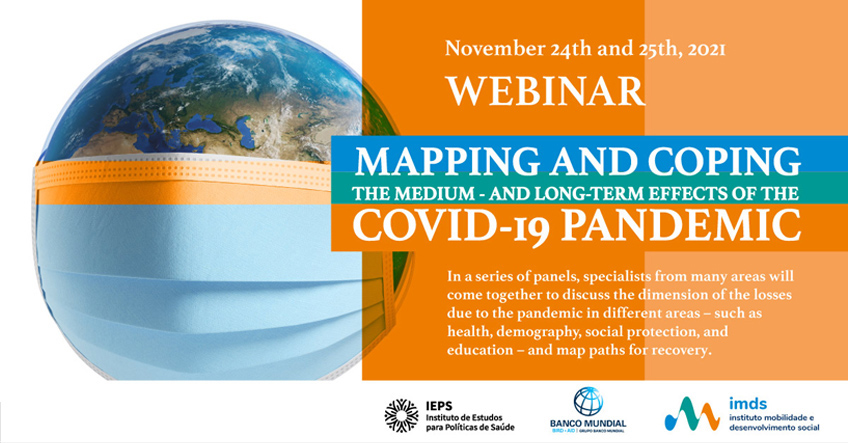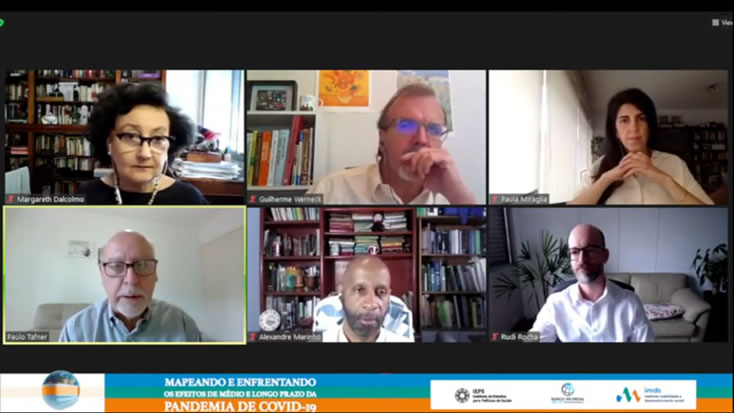
Eixo Educação da Redes de Desenvolvimento da Maré. Foto © Douglas Lopes
At an international event, IMDS, the World Bank and IEPS map the effects of the pandemic
In November, IMDs, the Institute for Health Policy Studies (IEPS) and the World Bank promoted the webinar “Mapping and Facing the Medium and Long-Term Effects of the Covid-19 Pandemic”, bringing together experts from various areas – such as health, demography, social assistance, and education. The objective was to try to measure the losses resulting from the pandemic and trace paths for the recovery.
Most of the panels focused their reflections on children and adolescents and their needs due to the impacts of the health crisis, seeking ideas to mitigate the losses that these segments of the population may come to suffer. The issues addressed included, for example: in education, how to resume without leaving children or young people behind? In health, what have we learned over these almost 2 years and how to deal with the direct and indirect effects of the disease? In demography, how does this impact public policies? How to integrate health, education, and social assistance systems to deal with the problems that will present themselves? And how to ensure the production of data that help in the monitoring of issues and decision-making by managers?
In a two-day online event, the debaters sought to suggest viable routes for public management to make up for lost time and recover: (i) schooling, considering the medium to long-term changes and effects brought about by the pandemic; (ii) health, thinking about what a post-vaccination prevention model should look like, how to deal with direct and indirect long-term effects, and based on which model; (iii) social assistance, seeking to integrate the services that will be required from the identification of problems in different spaces.
Other operational issues also appeared in the background, such as: are there necessary legislative changes, at the federal level, to deal with the new challenges? Is there a role for federal government coordination, and support?
Videos are available at https://www.youtube.com/watch?v=-wn_76Ybkk8&t=69s and presentations of participants can be found below.

Check out how the panels were organized:
Opening
November 24, from 9 am to 10:30 am
Proposal: contextualize the evolution of the pandemic, present the direct and indirect consequences, discuss the evolution of the vaccination and the coming perspectives regarding the disease and prevention and treatment strategies. With Paulo Tafner (IMDS’ CEO), Rudi Rocha (IEPS’ Research Director) and Pablo Acosta (Leader of the World Bank’s Human Development Program in Brazil). The debaters were Margareth Dalcolmo (pulmonologist and researcher at Fundação Oswaldo Cruz), Guilherme Werneck (physician and researcher in epidemiology) and Alexandre Marinho (planning and research expert at IPEA and professor at UERJ). Moderation by Paula Miraglia, director of Nexo Jornal.
Age panels
Cross-cutting themes:
• Changes in family composition and associated social and economic issues (new orphans; life expectancy; loss of income providers)
• Clinical aftereffects and long-term treatments (need of new health services, such as respiratory physiotherapy, and for continuous-use medications, among other effects)
• Aggravation of pre-existing chronic conditions due to the suspension of elective care
• How to “recycle” new technologies used in the pandemic for normal times?
• How to deal with the heterogeneous effects of the pandemic and not leave anyone behind?
PProposal: each panelist presented the issues relevant to their own area of expertise and how they see the interaction with the other areas in general and, in particular, based on the challenges brought by the pandemic. In addition, it also presented reflections on how public policy can act to alleviate such challenges.
See here Alexandre Marinho presentation.
Early Childhood Panel (0-to-5-year-olds)
Nov 24, from 10:45 am to 12:15 pm
Lack of prenatal care and worse neonatal health conditions (stress in pregnancy) and consequences for long-term child development. Absence of nursery schools and preschools. Delays in cognitive development – speech, motor, etc. Delays in socio-emotional development – interaction etc. Worsening nutrition. With Amanda Devercelli (Global World Bank Leader in Early Childhood) in Education; Rodrigo Oliveira (Municipal Health Secretary of Niterói, RJ) in Health; Rita Almeida (Latin America’s leading economist at the World Bank) in Social Assistance, and Ana Paula Gomes Matias (director of the Department of Early Childhood Care, representing Luciana Siqueira Lira de Miranda, National Secretary for Early Childhood Care) in Public Management. Moderation by Ricardo Gandour, journalist, and communication consultant for IMDS and IEPS.
See here Amanda Devercelli presentation.
See here Ana Paula Gomes Matias presentation.
Veja aqui Rita Almeida presentation.
Adolescent Panel (13-to-19-year-olds)
Nov 24, from 2:00 to 3:30 pm
Absence of classes and loss of income providers in the family. Delays and losses in learning. School dropout and abandonment. Early entry into the labor market. Learning inequality between different socioeconomic levels. How to integrate the school with SUS and SUAS for possible health problems that may arise: mental health of students and teachers and sociability. With Michela Carlana (professor at Harvard Kennedy School) in Education, Cristina de Freitas Grillo (pediatrician and psychoanalyst) in Health, Cecilia Machado (head economist at BOCOM BBM bank and professor at EPGE-FGV) in Social Assistance, and Aparecida de Fátima Pereira (Secretary of Education of Goiás) in Public Management. Moderation by Fábio Pupo, reporter at Folha de S.Paulo.
Children and Pre-Adolescent Panel (6-to-12-year-olds)
Nov 25, from 9 am to10:30 am
Absence of classes. Delay in literacy and consequences for continuing studies. Delays and losses in learning. Learning inequality between different socioeconomic levels. How to integrate the school with SUS and SUAS for possible health problems that may appear: mental health of students and teachers, sociability. With Claudio de Moura e Castro (PhD in economics from Vanderbilt University and former general director of Capes) in Education, Paulo Bonilha (pediatrician and public health physician, Municipal Health Department of Campinas and UNICAMP) in Health, Renan de Almeida Sargiani (professor, psychologist, cognitive neuroscientist and president of Edube) in Social Assistance, and Frederico Amâncio (Secretary of Education of Recife) in Public Management. Moderation by Cláudia Collucci, journalist for “Folha de S.Paulo”.
See here Renan Sargiani presentation.
Closing Panel
Nov 25, from 10:45 am to 2:15 pm
Discussion on how data production can contribute to more assertive choices by decision makers. How to transform data into relevant and accessible information. What are the particularities that must be taken into account at this time. With Eduardo Rios Neto (president of IBGE), Eleonora Cruz Santos (director of statistics and information at Fundação João Pinheiro) and Michael França (researcher at Insper and columnist at “Folha de S.Paulo”). Moderation by Ricardo Gandour, journalist and communication consultant for IMDS and IEPS.
See here de Eduardo Rios Neto presentation.
See here a apresentação de Eleonora Cruz Santos presentation.
See here Michael França presentation.